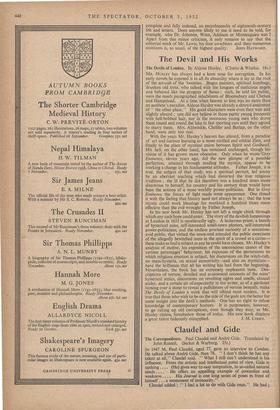The Devil and His Works
The Devils of Loudun. By Aldous Huxley. (Chatto & Windus. 18s.) MR. HUXLEY has always had a keen nose for corruption. In his early novels he exposed it in all its absurdity where it lay at the root of the art-cult of the 'twenties. Bogus painters, spiritual humbugs, drunken old trots, who talked with the tongues of malicious angels and behaved like the progeny of Satan ; such, he told his public, were the much paragraphed inhabitants of Bloomsbury and Chelsea and Hampstead. At a time when heaven to him was no more than an aesthete's paradise, Aldous Huxley was already a shrewd anatomist of " the other place." His good characters were even then wan and slightly absurd ; one did not believe in those pretty young innocents with bell-bobbed hair, nor in the strenuous young men who drove them round and round the lake in fast sporting cars until they agreed to marry them. Mrs. Aldwinkle, Chelifer and Burlap, on the other hand, were only too real. With the years Mr. Huxley's heaven has altered, from a paradise of art and curious learning to a more rarified and ethical Zion, and finally to the place of mystical union between Spirit and Godhead. His hell, on the other hand, has remained unchanged, though his vision of it has grown more obsessive. Only when he wrote 'Grey Eminence, eleven years ago, did the new glimpse of a possible perfection, attained through reading the mystics, appear to be working a change in his fundamental attitudes. Father Joseph, it is true, the subject of that study, was a spiritual pervert, led astray by an aberrant teaching which had distorted the true religious tradition ; the ill that he did therefore was a hundred times more disastrous to himself, his country and his century than would have been the actions of a more worldly power-politician. But in Grey Eminence the forces of light made some appearance. One closed it with the feeling that history need not always be so ; that the true mystic could work blessings for mankind a hundred times more effective than the evil wrought by Father Joseph.
In his new book Mr. Huxley has not left a single chink through which any such hope could enter. The story of the devilish happenings at Loudun in 1633 is unrelievedly ugly. A lecherous priest, a bunch of hysterical nuns, self-interested small-town plotters, self-interested power-politicians, and the endless prurient curiosity of a sensation- avid public, that visited the town, and attended the public exorcisms of the allegedly bewitched nuns in the spirit of a crowd at a circus— these make as foul a subject as any he could have chosen. Mr. Huxley's analysis of motive, his exposition of the unconscious causes of the various personages' behaviour, his exposure of the perversions to which religious emotion is subject, his discursions on the witch-cult, on mass-hysteria, on sexual eccentricity—and also on mysticism— have the brilliance that all his writing has had from the beginning. Nevertheless, the book has an extremely unpleasant taste. Des- criptions of torture, detailed and anatomical accounts of the nuns' hysterical antics, discursions on revolting sights and smells, cloacal asides, and a certain air of:superiority in the writer, as of a gardener turning over a stone to reveal a pullulation of vermin beneath, make The Devils of Loudun a work that will offend most readers. It is true that those who wish to be on the side of the gods are the better for some insight into the devil's methods. One has no right to refuse knowledge of contemporary horrors. It is purposeless, however, to go raking up old corruptions, even though they may, as Mr. Huxley claims, foreshadow those of today. His new book displays a great talent hideously misapplied. J. M. COHEN.


















































 Previous page
Previous page